
Become a member
Join today and help protect nature, beauty and history – for everyone, for ever. Enjoy access to more than 500 places with National Trust membership.
A Georgian landscape garden forged in an industrial past.
near Rowlands Gill, Gateshead, Tyne & Wear, NE16 6BG

| M | T | W | T | F | S | S |
|---|---|---|---|---|---|---|
Open
Closed
| Asset | Opening time |
|---|---|
| Gibside | 10:00 - 17:00 |
No booking requirement (excluding some events). Last entry into Gibside 1 hour before closing. Visitors must vacate the car park at closing time. Last orders in the main café 30 minutes before closing. All other food outlets operate reduced hours.
| Ticket type | With Gift Aid | Without Gift Aid |
|---|---|---|
| Adult (18+) | £18.70 | £17.00 |
| Child (5-17) under 5s free | £9.40 | £8.50 |
| Family (2 Adults and up to 3 children) | £46.80 | £42.50 |
| 1 Adult and up to 3 children | £28.10 | £25.50 |
| Group (Adult 18+) | £16.15 | |
| Group (Child 5-17) | £8.08 |
| Ticket type | With Gift Aid | Without Gift Aid |
|---|---|---|
| Adult (18+) | £19.80 | £18.00 |
| Child (5-17) under 5s free | £9.90 | £9.00 |
| Family (2 Adults and up to 3 children) | £49.50 | £45.00 |
| 1 Adult and up to 3 children | £29.70 | £27.00 |
| Group (Adult 18+) | £17.10 | |
| Group (Child 5-17) | £8.55 |
Red Kite adventure play area and the den building area can all be found along the family-friendly Explorer Trail.
Cycle parking is located at the top of the wooden walkway and close to the main café. Cycling is not allowed at Gibside, balance bikes only.
Six 11kW electric vehicle charging points are available in overflow car park. Chargers can be accessed using mobile app, RFID card, or contactless payment device. Visit our EV charging provider RAW Charging’s website to download the app in advance of your visit. Chargers are only available to visitors during property opening hours.
Electric vehicle charging point - more informationGibside Pizza Pit is open 11.30am-3pm on weekends and every day during school holidays.
Twenty accessible parking spaces. Accessible Tramper is available to book, call 07712 535938 in advance. Access bus available from Visitor Reception, subject to availability. Please ask Visitor Reception staff for more information.
Ask at reception for more details.
Accessible tramper hire is available. Please call 07712 535938 to book prior to your visit.
Front entrance gate - what3words: ///radio.composers.gasp
Frequent services from Newcastle or Gateshead. The X45 takes 30 mins from Eldon Square and Central Station, 25 mins from Gateshead Interchange and 10 mins from Metrocentre. It also takes 30 mins from Consett in the opposite direction. Alight on Station Road, Rowlands Gill. It’s then a 15-minute stroll to Gibside. Buses also from Stanley (15mins).
Enjoy 25% off admission when you show a valid bus ticket.
Cycle parking is in the Market Place, at the top of the wooden walkway and close to the Café. Cycling is not allowed at Gibside, balance bikes only.
Gibside is on the scenic Tyne Derwent Way, a 9-mile-route that runs from St. Mary’s Heritage Centre in the centre of Gateshead, along the River Tyne and then through the Derwent Valley to Gibside. The route is mostly traffic-free.
It is also on Route 14 of the National Cycle Network (NCN14). Find Gibside ½ mile from Rowland’s Gill. Follow signs from Station Road to join Burnopfield Road. Cross the River Derwent over a small bridge shared with vehicular traffic to find the entrance.
Plan your route to Gibside using the CycleStreets journey planner via the ‘by bicycle’ link below. (This journey planner uses OpenStreetMap data which is generally excellent but accuracy cannot be guaranteed. If you come to a footpath or other cycle-prohibited track, please don’t ride on it).
Cycle hire is available from several places in Newcastle. Please view this webpage for details: https://newcastlegateshead.com/blog/cycling-routes-in-newcastlegateshead
Discover nature and historic ruins set in a Georgian landscape garden while you explore miles of peaceful walking trails. Or dive into seasonal events that celebrate history, health, wildlife, and gardening.
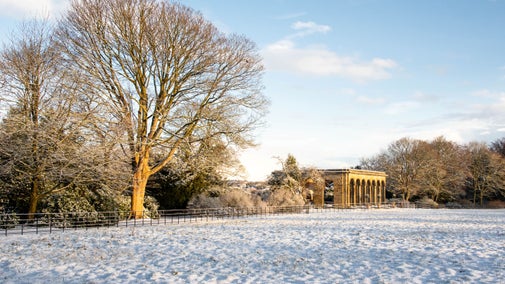
Gibside is the ultimate outdoor playground for families (from tots to teens). Whether you're climbing, swinging, or exploring, there's adventure at every turn. Wander the Explorer Trail, packed with nature and play areas or join events during school holidays.
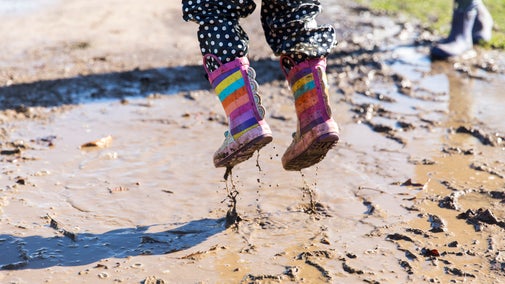
A landscape garden with family-friendly woodland trails. From peaceful strolls through the Walled Garden, where fragrant plants and seasonal vegetables grow, to adventures around the furthest reaches of the estate. Experience nature and history together, with Georgian monuments and vista views, ancient trees and wildlife.
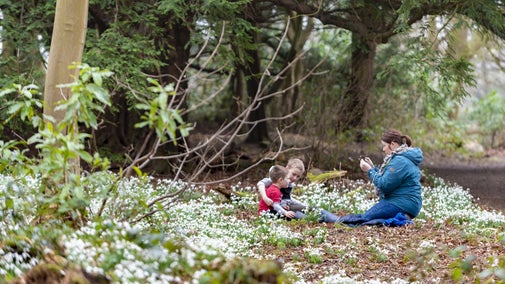
Gibside is a three pawprint rated place. There are 15 miles of paths for you and your dog to explore, lots of facilities and they’re even welcome inside the coffee shop.

There’s something for everyone at Gibside’s cafés, including freshly made sandwiches, wood-fired pizzas, kids' lunchboxes and, of course, really good coffee.
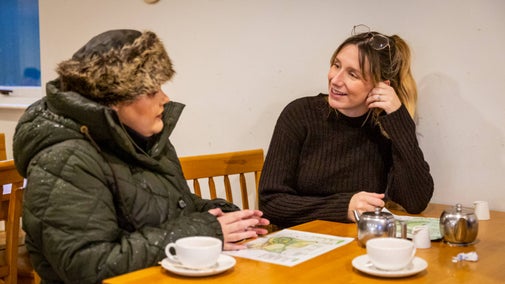
Gibside is the perfect place to bring a group of young people from schools, universities, Brownies and Scouts. Spark their creativity, build confidence, develop problem solving skills and enjoy nature.

Take a look at the Gibside map to help plan your visit. Find landmarks, facilities and access information.
Climb, slide and swing at the Red Kite adventure play area, or challenge your family to den-building. With acres of space Gibside is bursting with opportunities for kids (and big kids) to play, explore and connect with nature.
From nature bug trails and summer sports, festive magic and muddy scavenger hunts, Gibside’s calendar is packed with seasonal fun during the school holidays - you'll need to come back every week to do it all.
Gibside is a Georgian landscape garden with valley views, woodland, Walled Garden and grand tree-lined Avenue. Explore changing colours through the seasons, from spring blooms to summer wildflower meadows and golden autumns.
Explore four waymarked trails, from gentle more-accessible strolls to longer stretches for seasoned hikers. With sweeping views, riverside paths and trails that wind through woodland. Orienteering and geocaching add extra.
Gibside is a haven for curious naturalists. Home to amphibian filled ponds, bats, badgers and otters in the river. Red kites soaring overhead, roe deer and bugs galore.
Uncover stories of Georgian grandeur as you wander by Gibside’s dramatic Hall ruins and stand by the base of the Column to Liberty. Look inside the Palladian-style chapel, cobble-stoned stables and step inside the Orangery ruins.
From ranger-led nature walks to tours with the head gardener, Gibside offers enriching experiences for curious minds. Join community health walks and history tours uncovering stories off the beaten track.
Refuel with wood-fired pizza at the Gibside Pizza Pit, tuck into homemade scones and monthly stews at the dog-friendly cafe's or bring a picnic. Curl-up in one of the cosy reading corners at the second-hand bookshop.
From 14 February to 14 March, the National Trust is celebrating the release of Disney and Pixar’s “Hoppers”, in Cinemas 6 March. Discover the ‘Hop into the wild’ family trail, with storytelling and outdoor play.
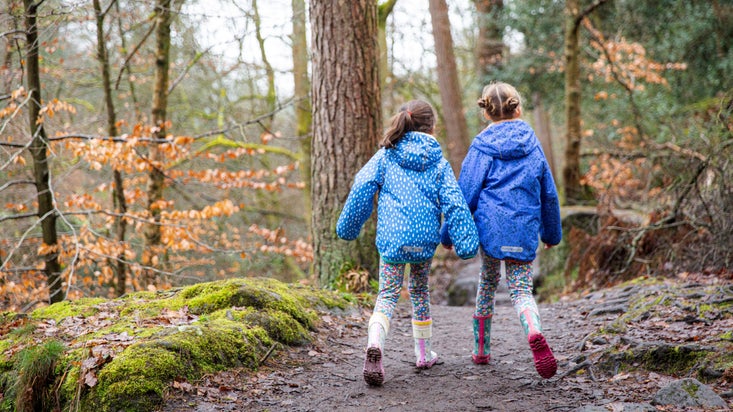
Discover nature and historic ruins set in a Georgian landscape garden while you explore miles of peaceful walking trails. Or dive into seasonal events that celebrate history, health, wildlife, and gardening.

Gibside is the ultimate outdoor playground for families (from tots to teens). Whether you're climbing, swinging, or exploring, there's adventure at every turn. Wander the Explorer Trail, packed with nature and play areas or join events during school holidays.

A landscape garden with family-friendly woodland trails. From peaceful strolls through the Walled Garden, where fragrant plants and seasonal vegetables grow, to adventures around the furthest reaches of the estate. Experience nature and history together, with Georgian monuments and vista views, ancient trees and wildlife.

Enjoy a circular walk in Gibside's 600-acre woodland that's fun for the whole family, getting active in natural play areas and exploring the best of the estate.
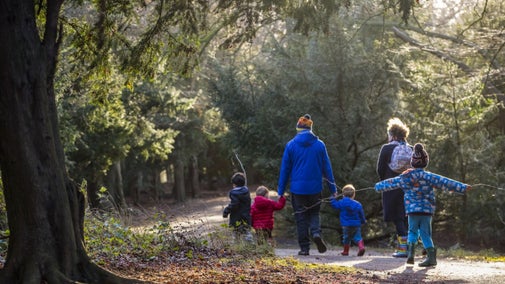
This route meanders around the landscape garden created by George Bowes and now in our care. You'll see grand historic features that play a huge part in Gibside's story and garden design.
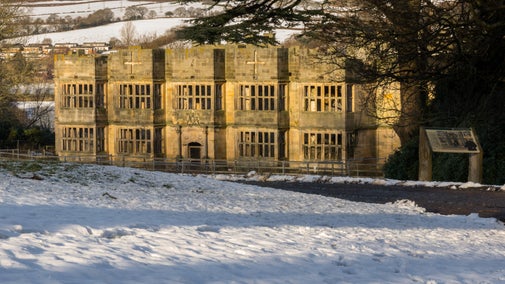
A challenging 4.4-mile walk through the estate at Gibside that takes in far-reaching views of the Derwent Valley.

Explore woodlands, meadows, wetlands and along the riverside, with estate highlights. You'll see nature at work and, if you are lucky, spot some wildlife at play.

There’s something for everyone at Gibside’s cafés, including freshly made sandwiches, wood-fired pizzas, kids' lunchboxes and, of course, really good coffee.
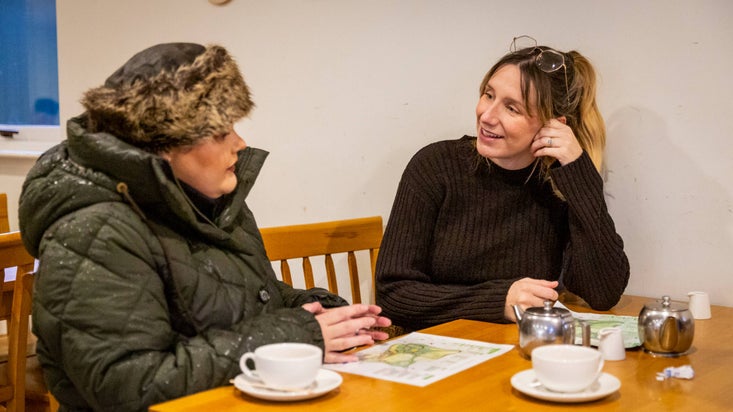

A cliff-top cottage perching in the shadows of the iconic red and white Souter Lighthouse.

The perfect location for long days exploring the outdoors as well as rest and relaxation amongst nature.

A cosy stone cottage in the beautiful grounds of the Wallington estate, perfect for walkers, cyclists and wildlife lovers.

A luxury lakefront cottage that’s steeped in history and surrounded by stunning views.
Hop into this self-guided outdoors adventure – with storytelling and play. Fun for all the family.
Get a taste for the history of Gibside with a Guided Walk volunteer.
Dive into the history of Gibside and take a walk with a Guided Walk volunteer around the 18th century landscape garden.
Celebrating International Women’s Day and North East in Blossom 2026.
Celebrate International Women’s Day listening to the colourful stories of six remarkable Bowes women and discover the tales of the female workforce that once lived at Gibside.
Deep dive into Gibside's stormy history on a scenic 6-mile walk and discover relics of the past hidden in the landscape.
An escape into nature on the edge of Newcastle, Gibside is a Grade I-listed Park and Garden that offers miles of walking trails through secluded woodland and views across the Derwent Valley.
A haven for wildlife, the ruin of Gibside Hall is a roost for bats, the Stables a nesting site for swallows, and the Octagon Pond a home for great-crested newts. Stand between the columns of Gibside Chapel and gaze down the oak tree lined Avenue towards the Column to Liberty to get a sense of the grandeur of the original Georgian landscape garden.
The Explorer trail is dedicated to families, from the adventure play area through the woods to a den building area.
There are seasonal events and regular guided tours for those who want to learn more about the history of the Bowes family, ancestors of the British Royal Family and creators of the landscape that we see today.
For those looking to unwind, curl up with a coffee in our café or second-hand bookshop.
We welcome all dogs to Gibside and know that it's a great place for them to enjoy. We do ask that they are kept on leads and that you clean up after them. Learn more about visiting with your dog.
The wealthiest heiress in Georgian times, horseback abductions, divorces and illegitimate children are just a part of Gibside’s incredible story.
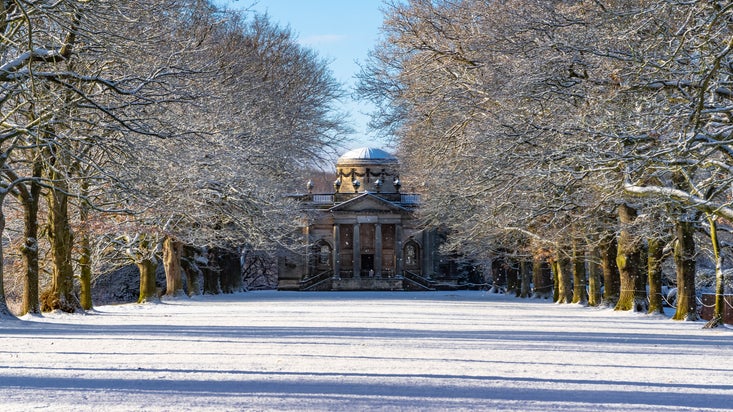
Learn about how we keep Gibside thriving and discover how we’re working to make a happy and healthy environment for wildlife, people and plants.

Interested in volunteering at Gibside? Here's all you need to know about helping us care for this special place, and how to apply if you'd like to get involved.


Join today and help protect nature, beauty and history – for everyone, for ever. Enjoy access to more than 500 places with National Trust membership.
By sharing your email address you’re agreeing to receive marketing emails from the National Trust and confirm you’re 18 years old or over. Please see our for more information on how we look after your personal data.